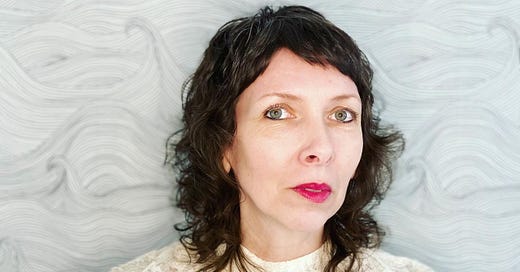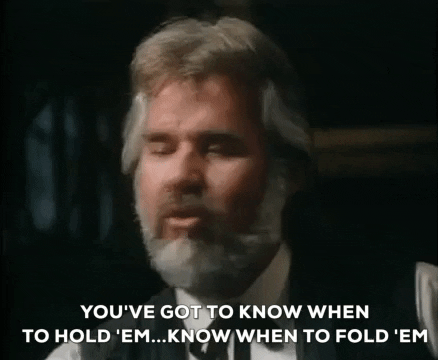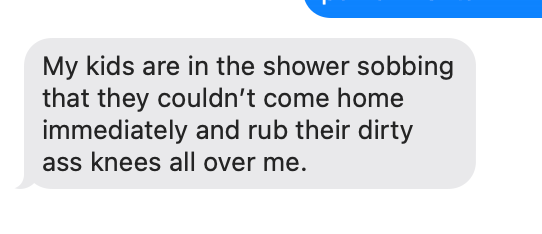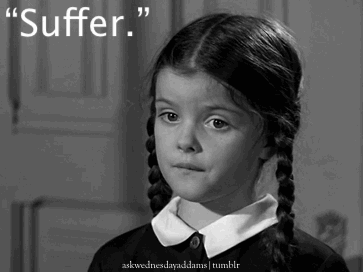Thanks for bearing with the newsletters’ hiatus. Ultimately we all got COVID but long story short I am currently asymptomatic and my husband and kids are back to normal and back to school. Many many thanks to everyone who checked in. We were lucky to ride it through pretty smoothly but that’s not the case for everyone affected by COVID. I hope you all stay safe.
Marriage with kids was never easy even before the pandemic. Then COVID-19 absolutely spatchcocked some relationships, in ways both dramatic and quiet. I think many women lately have been wondering whether they are “allowed” to leave a marriage even if there aren’t traditional triggers present like physical abuse, cheating, or extreme stress or trauma. Kimberly Harrington’s new book But You Seemed So Happy: A Marriage, in Pieces and Bits captures this moment in time and this quandary. In the book, she looks back at her ideas of romance, her marriage, and its nontraditional ending (as of interview time she and her husband, split up but not officially divorced, live together with their kids.) Even if you aren’t contemplating divorce, Harrington’s essays will make you reconsider these lifetime commitments we are primed to yearn for and prioritize. Yet this hard look goes down easy —Harrington, a humorist who’s written for places like McSweeney’s, will make you laugh, too.
How have you prepared yourself, as this book comes out, to answer a bunch of questions about the state of your divorce from readers and journalists?
That was a conversation I had with myself throughout writing it. The book that exists is definitely not the book I proposed. The book I proposed was “Well, divorce humor doesn’t exist; I’ll write some.” When this proposal was done, six weeks after we announced our divorce, I asked Jon, “How would you feel if I wrote a book about divorce?” He was like, “Uh, OK?” He went along with it. It developed into something super intimate.
I keep my family private: I don’t post my kids on my author Instagram, I don’t post Jon on there: he’s a very private person. But I get it. I’ve attended book events and been like “Yeah, but what about all the people you wrote all that shit about it?” I need to not get touchy about that. I don’t know how you can be a reader and not be curious as to how the real people in books feel. I’m not going to speak for Jon, but where the relationship is now is very easy. We just have such a strong friendship now. It’s so much better than it was during our marriage.
You write about how an upside to ending the marriage meant that you got to retire as the Head of Communications/Chief Birthday Present Buyer/Happy Anniversary Caller/Human Walking Reminder Lady. What were other immediate reliefs of ending the marriage?
What lightened the load is not pretending we had a working, happy marriage. I’m sure I’d be feeling that more if we didn’t have the pandemic. Towards the last few years, that was so unmanageable for me. It’s not like we were falling all over each other socially and posting gushy bullshit, but I can’t believe we were around other married people, acting like this is a marriage that is working. It felt dishonest to me. Even though people are utterly confused as to what we’re doing when they see us all together, that doesn’t bother me. Doing something really unusual and untraditional bothers me not at all.
You capture the confusion around memories, nostalgia and the way we internally write our family histories. “Do you remember how you desperately wanted things to start getting easier, which by default means you were wishing for time away? Do you miss it now? Hey, isn’t life dumb?” I feel that as my kids are getting older and I’m a little sad but mad at myself too because life was not easier when they were younger.
I cried the entire time I wrote Amateur Hour [which is about motherhood]. I was so wrung out by the idea that my kids would one day leave me, grow up and be traitors. But it’s awesome to start to watch kids go out on their own. When kids are younger, you can’t imagine an older version of this cute little kid with this cute little backpack. I’m the shortest one in my family now. Seeing them as young adults and creating their own relationships and having their own vibe on social media, it’s fun.
People often don’t know how to respond when a friend says their marriage is over—whether to express remorse, congratulations, fear, whatever. Who or what was actually helpful to you when you told folks about your divorce?
The most helpful thing was us just fully announcing our divorce super publicly in a digital carpet bombing of everyone. It was structured like an op-ed, cutting off every avenue: I don’t want your prayers; don’t cry for us; this is our choice; this is why we’re making the choice; goodbye. People will talk behind your back when you break up because we all do it, but no one came at me with any bullshit. Honestly, the only people who reached out were really supportive or were really curious or thought they should have gotten a divorce.
What helped me the most, and this is true across life, is knowing that nine times out of ten, people’s reactions are about them. Some people’s marriages are a lot more difficult than they’re leading on. They freak out. They thought your marriage was good, so what does that mean for theirs? If I really think about what the reaction is to my divorce, it’s because this woman’s husband cheated on her and they went to all this work to stay together and she is mad she did all this work. Most of the time, people’s reactions have nothing to do with you and that makes it easier to not engage, not get your feelings hurt and stay out of it. It’s just like grief, too, or losing a job, where the people you think you expect to step up won’t, and the people you never in a million years would be heroes would show up. It’s learning to be OK with that.
I think a lot of readers will strongly identify when you wonder about your marriage, “Did I want [my kids] to think that ‘not horrible but not wonderful’ is a benchmark?”
Oh YES. There’s kind of a running joke with my agent and editor that divorce is trending. This book was sold before the pandemic. So much of editorial culture was building steam around, “What is marriage? What is the point of this?” I think a lot of those conversations were centered around emotional labor at the time and the pandemic just exploded everything. I’ve said often if the pandemic had happened before we had figured out this arrangement, it would have been bad. I could kind of read between the lines of a lot of social media presences — they absolutely want to detonate their marriage right now but they’re trying to put a happy sheen on it and it’s very apparent they’re losing their shit. With Amateur Hour, which was about motherhood, people would comment on my post publicly. The reaction I hear from people via DMs and emails about divorce are private. This is very under the radar in terms of how they reach out.
I hope people don’t think the book is a how-to. It’s not. It’s one person’s story. I’m very aware it’s not going to work for everyone.
There’s a part in the book where you talk about all the things that have to go right to create a marriage—eating meals at the same time, combining your money, enjoying sex…with each other! As you say, “Seems like we sure expect a lot out of marriage, don’t we?” I wonder how you negotiate conflict with your ex now that you don’t have that looming thought, “I can’t believe I am socially and legally tied to this jag right now.”
I’m trying to get people to think differently about this thing that is actually kind of fucked up when you give it more than five minutes of thought. You would never expect from a friend what you expect from a partner. Put the sex aside: would you ever talk to a friend the way that you talk to your spouse? Never in a million years would you ever. Your friends would be like “Go fuck yourself.”
We expect this intimacy of marriage to be anything goes. I think for me, anyways, from me to Jon, it became corrosive. Now, what I think is interesting, with a marriage going into friendship, the friendship is always framed as a downgrade, and that is not the case. It is such an upgrade from where we were for half of our marriage, putting that respectful distance back where I would have it with a friend. It’s like we’re in kindergarten again. We say thank you, we say please. If I clean the house while they went camping, he texts me and thanks me for that and hopes it wasn’t too much work. We took that for granted when we were married. Friendship isn’t this milder, lamer form of our relationship. It’s an upgrade from where we were—dying on the hill of staying married. For what? What is the endgame here? This sucks.
This makes me think about conversations with friends who don’t get married or don’t have kids, where someone expresses regret at not having a family and you want to talk about the ways having a family doesn’t always feel like all it’s cracked up to be. But you don’t want to invalidate their feelings or seem like you’re trying to console them when you’re not.
I’ve been reading books by women who’ve chosen not to have kids. It’s given me a whole new appreciation for what a sensible path it is. It’s crazy to me that people pressure people to have kids. If you don’t want kids, please don’t have them. Even when you want them, it’s hard. I have a new appreciation for how at every turn women, not men, will hear, “Don’t worry, you’ll find someone. It’ll happen for you someday,” when you’re not expressing any interest in having kids.
I think it’s the kind of thing where there’s regret and joy on both sides. That’s what’s crazy-making: being in a hetero marriage with kids is so fetishized but not supported so you feel like that’s the only path and there’s joy and comfort in that path. It’s certainly easier, socially and culturally—you’re accepted wherever you go, but it’s not structurally supported for women. My friends who aren’t partnered or partnered without kids are traveling, having money, and having a really rich life. The women I know who don’t have kids didn’t want them and don’t regret it. I don’t feel sorry for them at all.
I appreciate that even if you don’t truly want something, it’s normal to grieve the path not taken, especially when you didn’t get to make the choice.
When you feel like you’ve missed out on something, you want to hear, “I’m sorry.” You don’t want to hear, “It’s bullshit anyways.” I’ve seen this happen so many times with friends who had the decision made for them. Mothers who can’t do anything but make things sound miserable about stuff will take that tack. “You’ve got it easy—you saved yourself!” If someone said that to me, especially as someone who’s had two miscarriages, I’d explode. I see that with women for whom it was easy to get pregnant, and women who struggle with fertility: it’s that same dynamic, not recognizing the grief and struggle. It’s so minimizing.
Did you really hear from readers who told you they, too, were also divorced but were keeping it a secret?
I don’t think it’s that uncommon. You don’t want to disappoint people. When marriage is always framed as good, divorce is always going to be framed as bad, as a failure. Do you want to disappoint your friends, your parents? People want to avoid feeling like they look like a loser, so they stay publicly married to avoid it.
You can and should learn much more about Kimberly and her work here. I also think you should check out her newsletter!
End credits
I hope you enjoyed this issue of Evil Witches, a newsletter for people who happen to be mothers who crave expert advice, nonexpert advice, laughs, salty takes, the occasional deep thoughts, and interviews for and about witchy moms. Some upcoming topics to keep an eye out for include advocating for your child in a medical capacity, how to handle the transition from compliant little kid to bitch-ass tween, and pet euthanasia.
If you like this newsletter, please consider supporting this independent, nonsponsored work and joining the subscription level, which gives you access to fun, honest and helpful discussion threads plus bonus content. It breaks down to pennies per week and I am not even going to try to get you to buy a beauty product or organic surface cleaner or baby food masher you don’t need. We may help you find one of those things that you DO need but if also you also don’t need anything, that’s cool too.
If you have any questions, feedback, or suggestions for the newsletter you can reply right to this email. You can follow us on Instagram here and talk to other witches on Twitter, too. And I always appreciate a shout on social media!







Yeee gods! You ALL got Covid, Claire! And you pulled everyone through, and now here you are enthralling us with a great Kimberly Harrington Interview!!
Loved this! And just signed up for her newsletter. I hit all of the newly divorced Bingo cards when I split from husband #1 back in 2004, brilliant!!